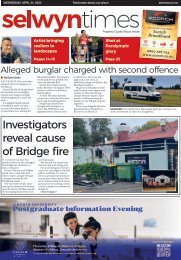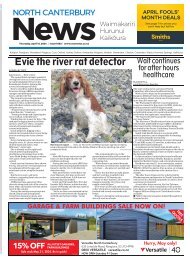Selwyn Times: June 20, 2018
You also want an ePaper? Increase the reach of your titles
YUMPU automatically turns print PDFs into web optimized ePapers that Google loves.
2<br />
10<br />
[Edition datE]<br />
Is it really ok to buy a p house?<br />
There is no denying that<br />
methamphetamine is a dangerous and<br />
insidious drug. Users come from all walks<br />
of life and live in all communities and some<br />
drug testing companies have claimed that<br />
up to 80 per cent of New Zealand homes<br />
could contain traces of the drug. However,<br />
the recent report from the prime minister’s<br />
chief science advisor has pointed out that<br />
most people run a very low risk of living in<br />
a property with dangerous levels of meth<br />
contamination.<br />
The May <strong>20</strong>18 report from Professor<br />
Sir Peter Gluckman found that there was<br />
no point in testing a property for meth<br />
contamination unless there was a strong<br />
suspicion or evidence that it had been<br />
used as a meth ‘lab’ or there had been<br />
very heavy drug use there. The researchers<br />
found no evidence of anyone being harmed<br />
from passive use and said there was no<br />
adverse health risk of third-hand exposure<br />
to methamphetamine residue from<br />
smoking found on household surfaces.<br />
Even if someone had been smoking<br />
methamphetamine within a property, any<br />
residue on household surfaces diminishes<br />
over time, so someone living in a property<br />
would not be exposed to a constant dose<br />
every day.<br />
According to the report, a house is safe to<br />
live in up to a methamphetamine level of 15<br />
micrograms per 100cm2, with no adverse<br />
health effects.<br />
No one wants to expose their family to<br />
any health risks or to make a significant<br />
financial commitment to a property if they<br />
are worried that it might go wrong.<br />
When it comes to looking at properties,<br />
it’s always better to rely on concrete<br />
knowledge or evidence rather than rumour.<br />
If you are concerned about a house you are<br />
interested in, ask the real estate agent if it<br />
has been tested, noting that levels less than<br />
15 micrograms per 100cm2 are safe to live<br />
in. If you don’t make the agent aware that<br />
methamphetamine is a real concern to you<br />
the agent is not obligated to tell you about<br />
results that are considered to be safe, with<br />
no health effects (in other words those<br />
below 15 micrograms per 100cm2).<br />
But if you have asked the agent about<br />
methamphetamine the real estate agent<br />
must tell you what they know about a<br />
property and must answer all queries<br />
honestly. If they are aware that a property has<br />
methamphetamine test results either above<br />
OR below 15 micrograms per 100cm2, they<br />
must tell you what they are.<br />
If the local council has been notified<br />
(usually by the New Zealand Police) that the<br />
property has been used as a site for heavy<br />
meth consumption or production, this<br />
should be recorded on the Land Information<br />
Memorandum (LIM).<br />
If you learn that a property has tested<br />
positive for methamphetamine before you<br />
make an offer (and you are still interested<br />
in buying it), your course of action depends<br />
on the level of the result and your appetite<br />
for the work required to put it right. You<br />
can seek advice from a meth testing and<br />
remediation company on the estimated<br />
amount of work required for results above<br />
15 micrograms per 100cm2, and negotiate<br />
with the seller for an according reduction in<br />
price. Alternatively, you can add a condition<br />
to your offer asking the seller to clean and<br />
decontaminate the property to an agreed<br />
acceptable level.<br />
Talk to your lawyer before making an<br />
offer on a property if you are concerned that<br />
it may be affected but you don’t have time<br />
to get it tested. They will be able to advise<br />
you about including a satisfactory test as a<br />
condition of your offer.<br />
Bear in mind that meth testing is not<br />
currently regulated in New Zealand. It may<br />
be a good idea to research the particular<br />
remediation company before you engage<br />
them. Be aware that composite field testing,<br />
where multiple samples taken throughout<br />
a property are combined into a single<br />
sample, can lead to false impressions of<br />
high exposure. This type of testing is not<br />
recommended.<br />
When the meth report came out Sir Peter<br />
Gluckman said people were more at risk<br />
from mould in homes than they were from<br />
meth contamination. His statement is a<br />
good reminder that there are lots of things to<br />
consider when looking for a house to make<br />
your home. Asking questions, weighing up<br />
real evidence is the only way to make sure<br />
you’ll sleep easy with your decision.<br />
Kevin Lampen-Smith is the chief<br />
executive of the Real Estate Authority<br />
(REA). For independent advice on buying<br />
or selling property, check out settled.govt.<br />
nz.


















